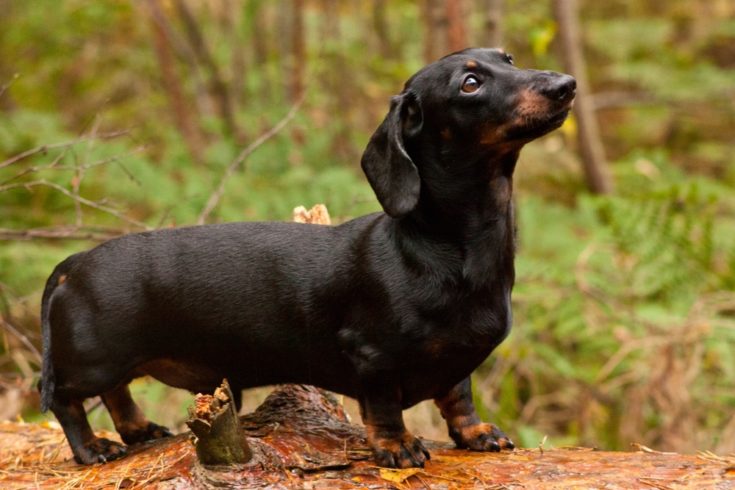Dachshunds, affectionately known as “wiener dogs,” are adored for their distinctive long bodies, playful nature, and endearing personalities. While their unique physique is often a topic of discussion, their dental health is equally important and often overlooked. Proper understanding of dachshund teeth—how many they have, their types, and how to care for them—plays a crucial role in ensuring your furry friend’s overall health and happiness.
Contents
How Many Teeth Do Dachshunds Have?

The number of teeth a dachshund has depends on their age. Like humans, dachshunds go through two sets of teeth in their lifetime: baby teeth and adult teeth.
- Puppy Teeth: Dachshund puppies have 28 deciduous (baby) teeth. These start erupting at about 3 weeks of age and are sharp but temporary.
- Adult Teeth: By around 6 months of age, dachshunds lose their baby teeth, replaced by 42 permanent adult teeth. This transition period, known as teething, can cause discomfort and lead to behaviors like chewing on objects.
Types of Teeth in Dachshunds

A dachshund’s 42 adult teeth fall into four categories, each serving a specific purpose:
1. Incisors
- Location: Front of the mouth.
- Number: 12 (6 on the top and 6 on the bottom).
- Function: Used for nibbling, cutting food, and grooming. Dachshunds often use their incisors for gentle biting during play or self-cleaning.
2. Canines (Fangs)
- Location: Behind the incisors.
- Number: 4 (2 on the top and 2 on the bottom).
- Function: Designed for gripping and tearing food. Canines are also a dachshund’s primary defense mechanism.
3. Premolars
- Location: Between the canines and molars.
- Number: 16 (8 on the top and 8 on the bottom).
- Function: Used for shearing and grinding food into smaller pieces. Premolars help dachshunds chew effectively.
4. Molars
- Location: At the back of the mouth.
- Number: 10 (4 on the top and 6 on the bottom).
- Function: The largest and strongest teeth, molars are essential for crushing and grinding food into a digestible paste.
Caring for Your Dachshund’s Teeth

Maintaining your dachshund’s dental health is crucial for preventing issues such as gum disease, tooth decay, and bad breath. Here’s how to keep their teeth in top condition:
1. Regular Brushing
- Frequency: Brush your dachshund’s teeth at least 2-3 times a week.
- Tools: Use a dog-specific toothbrush and toothpaste (never human toothpaste, as it can be toxic to dogs).
- Technique: Use gentle circular motions, focusing on the outer surfaces where plaque builds up most.
2. Dental Chews and Toys
- Provide dental chews designed for small breeds to help reduce plaque buildup.
- Choose chew toys that promote oral health and are safe for dachshunds.
3. Professional Cleanings
- Schedule annual dental checkups with your veterinarian.
- Consider professional cleanings to address plaque and tartar buildup that cannot be removed at home.
Common Dental Problems in Dachshunds
Despite regular care, dachshunds can develop dental issues. Being aware of these problems allows for early intervention:
1. Periodontal Disease
- Cause: Bacterial buildup leading to gum infection.
- Symptoms: Bad breath, red/swollen gums, and tooth loss.
- Prevention: Regular brushing and vet checkups.
2. Retained Baby Teeth
- Issue: Baby teeth that don’t fall out on their own, causing overcrowding.
- Solution: Vet intervention to remove retained teeth and prevent misalignment.
3. Malocclusion
- Issue: Misalignment of teeth causing an overbite or underbite.
- Impact: Difficulty chewing or jaw discomfort.
- Solution: In severe cases, orthodontic treatment or surgery may be required.
4. Tooth Decay
- Cause: Plaque buildup leading to cavities.
- Symptoms: Sensitivity to touch or food, visible discoloration.
- Solution: Dental fillings or extractions if necessary.
The Importance of Dental Health for Dachshunds
Healthy teeth are essential for your dachshund’s overall well-being. Poor dental health can lead to:
- Pain and Discomfort: Dental issues can make eating and chewing painful.
- Behavioral Changes: A dachshund in pain may become irritable or withdrawn.
- Systemic Health Problems: Untreated oral infections can spread to vital organs, such as the heart and kidneys.
Tips for a Lifetime of Healthy Teeth
- Start Early: Introduce dental care routines while your dachshund is a puppy.
- Monitor Chewing Habits: Provide safe objects for chewing to prevent tooth damage.
- Feed a Balanced Diet: A high-quality diet supports strong teeth and gums.
- Stay Consistent: Regular care prevents minor issues from escalating.
Conclusion

Understanding and caring for your dachshund’s dental health is a vital aspect of their overall care. With 42 adult teeth designed for biting, tearing, and grinding, dachshunds rely on their teeth for daily activities. By brushing regularly, providing appropriate dental chews, and scheduling routine checkups, you can ensure your dachshund’s teeth remain healthy and strong. Remember, a healthy mouth contributes to a happy, active, and fulfilling life for your beloved wiener dog.
